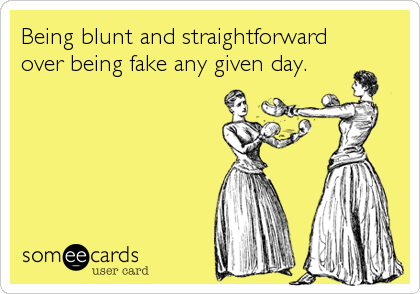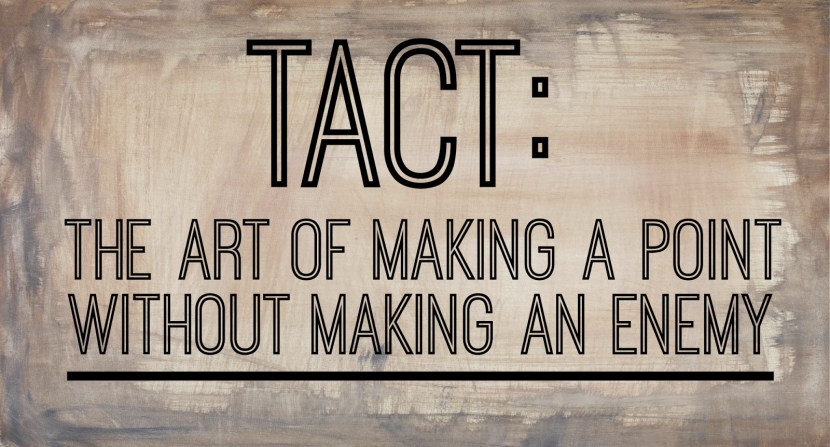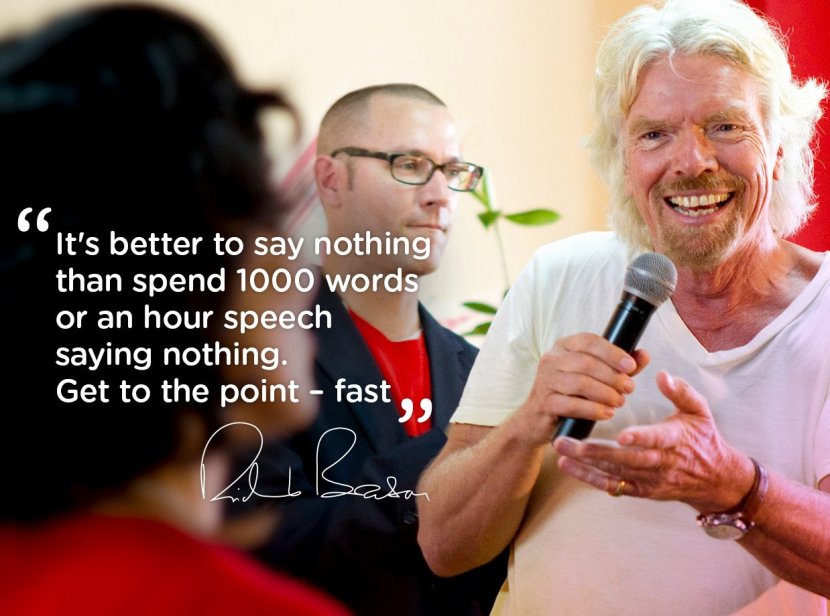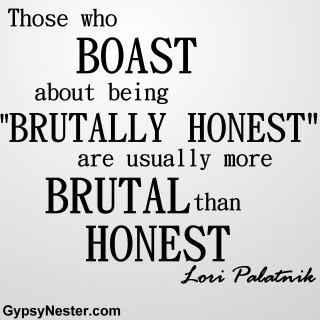Tagged: Communication
Being Blunt Again
In 2013 I wrote the post Can I be blunt. In light of the current erosion in our Nation’s capital (I mean YOU #45), I felt it was a good time to update and re-post it, and remind everyone that while it is paramount that we be truthful with each other, tact is even more important!
* * * * *
What’s the difference between tact and blunt? When you are being honest are you tactful in your delivery, or are you being blunt? Do you make a conscious decision when to invoke either approach or is your personality simply always tactful or always blunt? Well, let me be blunt … I recommend using both at the same time.

The dictionary defines tactful as: “a sense of what is fitting and considerate in dealing with others, so as to avoid giving offence; having skill or judgment in handling difficult or delicate situations.”

Blunt has a much more, well…blunt, definition: “lacking subtlety; straightforward and uncomplicated, quick and to the point.” Also many people who wrongly pride themselves on being blunt, are really being rude. There’s a very short and fine line between bluntness and rudeness. Clearly our current President has ample rude-bluntness (one of the selling points for those who voted for him), and none of the tact (again, sadly, one of his selling points to his fans).

While I am a huge proponent of being blunt (I do think there’s too much candy-coating these days), I only advocate bluntness when it is colored with tact. Tact is the tempering that keeps bluntness from being rude.

I bring this up today because I find that often my clients aren’t honest with themselves or those around them, and a little “cutting to the chase” (i.e., being blunt) could really help them move forward in their lives. If this resonates with you, read on…
For me, being blunt means speaking straight to the point in a quick and honest way. I don’t like to tiptoe around an issue, hoping that the recipient gets the gist of what I’m trying to say, and with the sentiment that I intended. But unlike some people who get labeled as brutally honest (i.e., their truth tends to hurt), I feel that if you deliver your blunt honesty with compassion and respect (i.e., tact) you will not be brutal and ideally you may be helpful.

Being too tactful (without bluntness) has it’s own set of problems. This approach often results in a wishy-washy delivery of what you think the person wants to hear. Inside you’re thinking I wish I could just tell them the truth, but what comes out is a round-about soft-ball that doesn’t really get things resolved. How much time is wasted in your life having misdirected communication because you’re trying to be tactful. If someone asks for your opinion, or you are in a position to offer helpful wisdom or advice – do it quickly, compassionately, and be succinct!

That leads me to my other favorite word when it comes to communication between people – succinct. Succinct means: “marked by brevity and clarity; concise.” Succinct goes beautifully hand-in-hand with bluntness, as both imply quick or brief, and being succinct when you’re being tactfully blunt is helpful as you won’t overkill your message. Get to the point, deliver your message with kindness (even when it’s constructive criticism) and then stop talking and let your words sink in. (Again, if our current leader could only follow this advice.)

So the next time you need to be honest about something of importance to you or another person, be tactfully-blunt, and succinct, and you will enjoy a quicker resolution and likely receive more appreciation and respect from those around you.

The Art of Relationships
For most people, success in life is measured by the job they hold, the money they make, and the possessions they acquire. We raise our children to aim for this trifecta, focusing on school and grades and constant “upward” movement. Unfortunately I feel the most important skill or tool that we can provide our children with to help them “succeed” in life is often the least focused on – relationships.

Relationships are the essence of our lives and without the ability to maintain good relationships, I believe we truly cannot succeed. From home life to the office, if you cannot communicate and work well with people, your forward movement is limited. If you do not have a supportive group of family and friends (co-workers too), all of your challenges and hardships rest solely on your head and shoulders.

But a person who cultivates and cares for relationships above college degrees, money, and acclaim is a person who will get further than just their career/life experience will take them. Did you know that people who were in fraternities or sororities are 60% more likely to have successful careers because they have a network of built-in friends to gain support, leads, and referrals from? Again, it’s about relationships!

Consider two people with the same exact education and experience applying for the same job. Person A has not learned the fine art of conversation, improvisation, and the ability to find something to relate to with everyone they meet. Person B puts relationships and real communication paramount over everything else they do, and they want people to be comfortable around them. Guess who gets the job?


In this age of technology-focused society, the current generation(s) are learning texting instead of talking. We are pushing our youth to stay ahead of the curve with their computer skills and educational goals, which is essential to stay competitive with other countries, but they’re missing out on skills that can really make the difference in the quality of their lives, as well as their careers.

It’s the same for intimate relationships (marriages, partnerships). A person who is content with only their significant other and/or children for company and does not work at maintaining relationships with life-long friends (who often have moved far away) or does not seek to create new friendships is keeping their world (and therefore their growth) very small and limited. This also teaches children that friendships and the work required to maintain them is not as important as having a family and plowing forward.

My mother instilled in me the fine art of conversation, something seriously lacking in so many adults, not to mention children, these days. She said there was always something to talk about with anyone you meet. She taught me to ask questions, and then listen to their answers. While this skill has helped me more times than I can count (garnered me many a job lead or an awesome new friend), I am saddened to see how many adults cannot reciprocate. Often they do not engage in asking questions back – a “get to know you” kind of exchange. Once I’m done “interviewing” and offering a few clever anecdotes of my own, the conversation ceases as they do not know how to communicate back. So many people feel uncomfortable unless they’re only talking about themselves (which is very one-sided). How do you fare where you are forced to mingle with people you do not know?

In the next week as you think upon this post, look at how you communicate with friends and strangers. Look at how they communicate back to you. See if you can find examples of where your relationships with someone benefited your goals, or where not having certain types of relationships have held you back. Then see what you can do to improve the quality of your relationships and communication skills. Remember there is value in having true, honest and reliable relationships in your life, and those relationships start by you being true, honest and reliable.

Truth Is Hard
Almost everyone I talk to in my capacity as a life coach and friend has said to me at some point “I just don’t like confrontation.” If you read my March 2013 article Confrontation or Communication (and if you haven’t you might want to) then you know that the word confrontation has a bad rap. More to the point, 90% of the time when you think something is, or will be, confrontational, what’s really at stake is that you need to tell someone something you know they don’t want to hear and therefore assume they will become defensive, which makes you offensive – or the bad guy.
But I’m here to tell you that while truth is hard, truth is always better and more beneficial than passive aggressive attempts to soften a blow, or worse yet, sheer avoidance. So take stock of your life and relationships, and see if there’s something you need to say to someone that you’re just not saying.
Are you afraid you’ll feel guilty – that’s usually what holds people back from sharing a important truth? Let me remind you that guilt is an emotional trigger designed to let your heart know when you’ve been ethically or morally wrong to another (or yourself). Telling the truth about your feelings, especially if done with tact and respect is never ethically or morally wrong. As for tact and respect, that does not mean candy-coating or making the ‘lead’ be so buried under tangential fluff that the recipient never really understands your feelings. How you keep tactful and respectful is by staying succinct, on point, and keeping it about facts and YOUR feelings.
Say for example your friends or family want to come visit for a week-long vacation. You haven’t enough room to house them all comfortably, and you have too much on your plate with work, kids, after-school activities, budgetary concerns, etc., so it would be highly inconvenient for them to stay in your home for an entire week, especially when you are not on vacation too.
You’re reluctant to tell them the truth and hurt their feelings, disappoint them, or screw up their plans, especially since it would feel like the dreaded “confrontation” because they’ve made it clear that this is happening regardless of your feelings. That is of course, because you haven’t been upfront with your feelings!
So you say something like: of course you’re welcome, but I can’t take any time off to be with you and we don’t really have enough beds for all of you. They say not to worry, they don’t mind sleeping on the sofa or floor and will be gone most of each day sightseeing . But you know that you’ll feel the stress of wanting to keep your house clean, keep your kids on their routines and schedules, and just have your own space after a long day of work.
Then you try the more direct approach, though still veiled: any chance you can schedule this for the week of [blank] because they kids have no school then and I can take some vacation days or even join you at a hotel and have a staycation? Once again, they appreciate your idea or concern, but assure you that this is the best for them and they’re okay with you not being available.
 Either way you been passively vague about how their visit would affect you, and neither approach took care of your needs. Now my response from the start would be I would love to see you but I have to be honest the weekdays are just not good for us to have guests. I hope that doesn’t mess up your plans, and if you need any help finding affordable hotels in the area I’d be happy to get you some recommendations.
Either way you been passively vague about how their visit would affect you, and neither approach took care of your needs. Now my response from the start would be I would love to see you but I have to be honest the weekdays are just not good for us to have guests. I hope that doesn’t mess up your plans, and if you need any help finding affordable hotels in the area I’d be happy to get you some recommendations.
Most people will appreciate that you didn’t martyr yourself and in many cases they would feel the same way about a disruption to their work/school week. Others may not, but again I remind you that you have not been wrong to them, you’ve been honest and right for yourself and your family. If they are disgruntled by this it’s because they wanted or needed to save money and you’ve thrown a wrench into that. But is it fair that they put a strain on your resources and family’s’ needs because they want a vacation they can’t fully afford?
I understand that with family these concepts are often unimaginable due to the idea that family means unconditional acceptance and family-imposed burdens are a fact of life. But I feel that even with family, once we’re all adults, we have the right to put our needs and feelings first if the opposite would cause a detrimental disruption to our lives. Of course, I’m not talking about emergencies / crises – that’s when we do whatever is needed to be there for each other. My family and friends know that’s my code. But when their needs are voluntary or elective, then I speak the truth. Ultimately I do believe your friends and family will respect you for it, and if not, at the very least, you’ll have a less stressful week! Think about it, and as always I love to hear your perspective.
Girl Vs. Girl
I have been preparing my 9 year old daughter for several years now for one of the less favorable rites of passage that elementary girls encounter as they grow towards teen years … that of mean girls. Sadly the inherent competitiveness of females towards each other starts this early and I have recently realized that for some, the feelings of petty jealousy do not stop at any age.
I see signs of this girl vs. girl competitiveness from the playground to the workforce and at parties and social gatherings. It starts with the physical assessment – are they prettier than me, is their body in better shape, are they dressed too provocatively? Then it progresses into a fevered quest to find out some personal information that will prove their life is not better than yours, or that they are NOT as good as you – commonly known as gossip. Lastly communication breaks down into a series of anecdotal recounts of one’s life to one up the other – often using voice inflections heavy with condescension and superiority.
I watch this in action frequently at the gym and restaurants. A 20-something “hottie” will saunter past a group of over-weight “mom” types. First come the glares, then the whispers, and finally loud encouragement from the “pack” that they’re each doing great. Of course, this dynamic happens in the reverse too. Often it’s the heavier girl at a nightclub who is subjected to a gaggle of anorexic Barbies walking past with their noses in the air, and their I’m so pretty hair flips. (Yes I’m generalizing and stereotyping, but I’ve seen it happen repeatedly enough to use it here.)
This constant competition between women has saddened me for years. I get that it feels like we’re all in competition for the few good men, but we’re really not. Men have just as much at stake when searching for true love, and they receive just as much rejection as we do. But the difference is that men (and boys) don’t seek to tear each other down the same way women (and girls) do.
The feelings of jealousy and inadequacy that you feel when you see someone you think is better looking or happier than you is not their fault. You should all know by now that the grass is NOT always greener on the other side. That “beautiful” person may in fact be miserable on the inside, or maybe battled cancer, or was abused by someone. Your life is your life – your body is your body. It’s up to you to make your life and body be the most it can be and then be happy (and satisfied) with it all. When you’re not up to snuff – fix it – don’t make yourself feel better by enjoying the knowledge that someone else isn’t perfect too. Bringing someone down doesn’t lift you up. These are the lessons I’m sharing with my daughter.
I have more than once met women who were absolutely beautiful on the outside only to find that their insides were shallow or mean, and that their lives were not as envious as I had thought. But this knowledge never made me feel better – it made me sad that someone with such gifts wasn’t all that I had admired initially. It made me strive even harder to be happy with what and who I am and to appreciate all that I have, and go after all that I want.
Women we shouldn’t compete – we should complement each other. My many girlfriends and I do just that. If you are missing this kind of support in your life, perhaps it’s time you got better friends – or became a better friend yourself.
The Art of Saying NO
There are a handful of powerful words in our language, words that carry huge weight despite being small, simple, and often one-syllable. For example: love, hate, yes, and no. 
Love and hate are obvious in the power that they hold and the hurt they can yield. We toss them about casually to describe foods or movies, and we treat them as precious items where issues of the heart are concerned.
 Yes has positive attributes attached to it: it’s a door-opener, an affirmation, an agreement. It’s unoffensive and easy to say (Perhaps too easy.)
Yes has positive attributes attached to it: it’s a door-opener, an affirmation, an agreement. It’s unoffensive and easy to say (Perhaps too easy.)
No on the other hand, has a hugely negative stigma bound to it. It’s a conversation-ender, a nullification, a denial or refusal. Definitely leans towards offensive, and for so many is very difficult to say. But I feel the word NO has a bad rap. It’s not a bad word, it’s just misunderstood and often over used in the wrong arenas. Sure we say “no” to our kids a lot, or we say “no” to changes in our lives, but again, those are not what NO is best suited for.
 NO is most powerful when used by an individual to defend their needs. As my clients and blog-followers know, I do not abide martyrs: people who cannot say NO when they need to; who cannot speak the truth in their heart for fear of rejection, then suffer silently (or all too often suffer while complaining repeatedly). These are the people who are over-booked, over-whelmed, over-stressed, and under-respected by those around them. (Honesty and assertiveness garner more respect than martyrdom.)
NO is most powerful when used by an individual to defend their needs. As my clients and blog-followers know, I do not abide martyrs: people who cannot say NO when they need to; who cannot speak the truth in their heart for fear of rejection, then suffer silently (or all too often suffer while complaining repeatedly). These are the people who are over-booked, over-whelmed, over-stressed, and under-respected by those around them. (Honesty and assertiveness garner more respect than martyrdom.)
If this resonates even a little inside of you, then please heed these words. Embrace NO. However, don’t over use it or get so caught up in saying NO to everything that you miss the point of this. I’m only talking about when you don’t want to commit to that one more commitment that you’ve no time for, or when you feel uncomfortable with a situation, but stick it out for fear of disappointing someone else. NO is there to keep your true self true. See NO as your protector. A way of standing up for what you need. If given politely but honestly no one will suffer, I promise you. (See last week’s blog on being blunt: https://lifefitnessbydane.wordpress.com/2013/09/17/can-i-be-blunt/.)
So repeat after me: no, no thank you, thanks but no, that’s not for me, no I’ll pass, etc.
Can I Be Blunt?
What’s the difference between being blunt or tactful? When you are being honest are you tactful in your delivery or are you blunt? Do you make a conscious decision when to invoke either choice or is your personality simply always tactful or always blunt? Well, let me be blunt … I recommend using both at the same time.
The dictionary defines tactful as: a sense of what is fitting and considerate in dealing with others, so as to avoid giving offence; having skill or judgment in handling difficult or delicate situations. Blunt has a much, well blunter definition: lacking subtlety; straightforward and uncomplicated.
 Here’s why I prefer to be blunt as long as it is colored with tact. Blunt is quick, straight to the point, and usually honest. I do not have to candy-coat or tiptoe around the issue and hope that the person got the gist of what I was trying to say, and then hope further that they interpreted it with the sentiment that I intended. That’s way too much soap-opera delivery for my taste.
Here’s why I prefer to be blunt as long as it is colored with tact. Blunt is quick, straight to the point, and usually honest. I do not have to candy-coat or tiptoe around the issue and hope that the person got the gist of what I was trying to say, and then hope further that they interpreted it with the sentiment that I intended. That’s way too much soap-opera delivery for my taste.
But unlike some people who get labeled as brutally honest, i.e., their truth tends to hurt, I feel that if you deliver your honesty with compassion and respect (tact) you will not be brutal and ideally you will helpful.
Being too tactful (without bluntness) has it’s own set of problems. This approach often results in a wishy-washy delivery of what you think the person wants to hear. Inside you’re thinking I wish I could just tell them they’re being silly or blind. How much time is wasted in your life having misdirected communication because you’re trying to be tactful. If someone asks for your opinion, or are in a position to offer helpful wisdom or advice – do it quickly, compassionately, and be succinct!

That leads me to my other favorite word when it comes to communication between people. Succinct means: marked by brevity and clarity; concise. Succinct also goes hand in hand with blunt, as both imply quick or brief. (Ah, the beauty of something put simply, clearly, and honestly makes me smile.)
So the next time you need to be honest about something of importance to you or another person, be tactfully-blunt and your life will move on quicker and be the better for it.
ADDICTED TO NOISE
When was the last time you drove in your car in complete silence? No radio. No cell phone conversations. Just the ambient noise of the world around you. Do you ever sit in silence in your own home (and being asleep does not count)? Stop and think about how much noise surrounds you, surrounds us all, all the time.
I am amazed how often friends of mine leave their TV’s blaring while we try to converse in person or on the phone. I believe they are truly oblivious to it, unaware that the noise is a distraction, unaware too, that they are talking louder to overcome it. Likewise, in the car: having background music is one thing, but commercials that air louder than the last song, are frequently not turned down. The driver seems indifferent to the intrusion of the radio into our conversation.
Are you guilty of any of these examples? Worse yet, do you find comfort in having noise around you when you are alone? Do you need the TV to be on when you are home – just to give the illusion that you are not alone? Remember, being alone does not equate to loneliness.
Recently I took a long hard look (or should I say, listen) to how much noise assaults us on a daily basis. It is one thing to volunteer for this noise abuse. We control our radios, televisions, and streaming internet. But how about those gas stations with video screens blasting commercials at you while standing at the pump? The gas station in my neighborhood has the same commercial loudly playing from one screen for both sides of the pump island. The problem is that these commercials are not in sync so there is a 1-2 second delay from one side of the screen to the other. This results in a confusing barrage of unintelligible noise that no one pays attention to. So what is the purpose? Surely this method of advertising does not result in sales!
Why is a Life Coach addressing this, you may ask? Because how on Earth can we sort through the jumble of questions, worries, and responsibilities slam-dancing inside our heads, with so much grenade-like noise disorienting us on the outside? With so much to get done, both individually and globally, how can we focus with the volume (pun intended) of chaos that constantly bombards us.
When I was studying acting, a director assigned us to memorize lines and rehearse scenes while standing between a television and radio (with both electronics turned on, of course). The goal was to maintain keen focus while surrounded by distractions. That is a great tool for an actor. But most people are not trained with this skill, and furthermore, this is not a skill to employ when you need to reduce stress, relax your body and mind, and think clearly!
In the next week I challenge you to make some quiet time for yourself. If you live with one or more people, especially those with children, you cannot imagine how therapeutic a brief period of time spent in silence can be. Find a time when you can be alone, or at least a room where you can isolate yourself from distracting sights and sounds, and just BE. You don’t need to do this for long – I’m not suggesting a meditation session (although that is a rewarding experience). Just a few minutes where you can feel yourself breathe. Listen to the “softer” sounds around you, the noise of your home or yard.
Also perform this silence test while driving in your car. Do not be surprised if you start talking or singing to yourself. We are so conditioned, addicted if you will, to having noise around us, that when forced into a situation of silence, we fill in that space without even thinking about it.
For a real challenge, take a walk in the wilderness, or in the still of the early morning. Do not wear an iPod, do not engage in conversation if you have a walking partner. Just walk, observe the sights and sounds of nature around you.
 My attack on noise may seem trivial to you, but I assure you on a global level noise pollution is staggering and its impact is hugely detrimental. On an individual level it is just one more way for you to get distracted and lost from achieving your goals and being happy. If one person at a time can make their world a little quieter, then soon the entire world will be a little quieter. Then maybe we can all get more positive changes done!
My attack on noise may seem trivial to you, but I assure you on a global level noise pollution is staggering and its impact is hugely detrimental. On an individual level it is just one more way for you to get distracted and lost from achieving your goals and being happy. If one person at a time can make their world a little quieter, then soon the entire world will be a little quieter. Then maybe we can all get more positive changes done!
GREAT EXPECTATIONS
For those of you who have read Dickens’ quintessential novel Great Expectations you should understand, as the Hero Pip learned repeatedly, that having expectations leaves you open to disappointment. Yet I repeatedly encounter clients who suffer from angry or hurt feelings because they had imposed expectations upon a loved one, or made assumptions about a situation, only to experience a completely different end than anticipated.
To me, having expectations is akin to hoping, dreaming, imagining – more fantasy than reality. Don’t get me wrong, I believe strongly in the positive power of hoping, dreaming, and imagining, but only for the purposes of motivating, inspiring and planning. Once a solid dream or hope has been focused into proactive action, then you are truly on your way to achievement. However, you still cannot expect that these plans will turn out exactly as you planned. There are too many variables out of your control. But a solid plan (which in a way carries within it’s structure an “expectation,” albeit as a minor role) has contingencies built in, so ultimately you can, and will, succeed in achieving that which you had hoped, dreamed or imagined.
The most rampant misuse of expectation is assuming a specific reaction (or action) from another person. This is where you set yourself up to fail and suffer emotional distress. Raise your hand if you have ever said or did something nice for someone with the expectation that they would return the favor. Okay, now raise your other hand if you were disappointed by their response. Did they react less enthusiastically than you expected? Did they not treat you or comfort you as wonderfully as you had them? Did you feel ignored or underappreciated? Now the bigger question: has this happed to you repeatedly and/or frequently?
Look at any situation where you felt hurt, angry, or betrayed. Did you possibly place expectations upon an individual that in reality were contrary to how they operate? Think about this – there are two types of “inherent personalities” in this world (the two extremes, that is): selfish personalities and generous personalities. Some types wake up in the morning and immediately think about what they can do for their family and friends to make them happy. Others’ first thoughts are what they can do this day to make themselves happy. This does not mean that inherently selfish types cannot learn to balance their tendencies with acts of selfless consideration and thoughtfulness. Likewise, inherently generous martyring types can temper their selfless habits and learn to pay equal attention to their own needs.
Where your understanding of these two types is important is knowing that if your spouse is inherently selfish and you are inherently generous, then an expectation that he/she will treat you (or respond to you) exactly as you would treat or respond to them is a recipe for serious disappointment. Conversely, the inherently selfish type may often suffer from feelings of chronic guilt because he/she never seems to satisfy their inherently generous loved ones.
The solution is two-fold. First, look at the person you are dealing with and honestly examine how they operate. For example if you are dealing with someone who is overly-excitable and tends towards short-fused, emotional outbursts, then expecting a calm and rational response to certain situations would be foolish on your part. If you are hoping to elicit a strong emotional reaction or instant decision from a loved one who is slow-pondering and indecisive, be prepared for serious frustration.

Next, and most importantly, whenever possible, examine your expectations and see if your intentions are less about what you are giving and more about what you are hoping to receive. Sometimes we operate on “auto-pilot,” acting and reacting out of what seems like a need to help or give to another, when in reality, we are really wanting to receiving something we need (emotionally). If you can resign yourself to either (a) focusing strictly on the “giving” and not expecting a specific (desired) reaction or result, or (b) be more straight-forward and ask for what it is you truly need, then you will may indeed sidestep this “great expectations” vicious circle.
Confrontation or Communication
As a Life Strategies Coach, I work with clients to clean up the clutter in their lives, literally and figuratively. The “literal clutter” cleanup is easy: figure out your goals, come up with a systematic and achievable plan, get organized, and go for it! Clearing away the “figurative” mind and emotional clutter takes a bit more work. This type of c lutter is usually the result of feelings not shared with a spouse, friend, co-worker, or family member. Holding on to these hurt, angry, frustrated, or confused feelings often results in low self-esteem, self-doubt, reluctance to take action, and even physical illness or pain.
lutter is usually the result of feelings not shared with a spouse, friend, co-worker, or family member. Holding on to these hurt, angry, frustrated, or confused feelings often results in low self-esteem, self-doubt, reluctance to take action, and even physical illness or pain.
The typical reason that most of us do not vent these vitriolic emotions is due to fear of the dreaded . . . confrontation. What’s so bad about confrontation? Isn’t it, after all, simply communication? Communication: good. Confrontation: bad! (Said the grunting monster.)
The problem is that most of us associate confrontation with aggression, anger, attack, sometimes even violence. According to the dictionary, the root of confrontation – confront – means: “to face in hostility or defiance, to oppose.” This is clearly what most of us wish to avoid. But it also states the following: “to stand in front of or meet facing; to present for acknowledgment.” That doesn’t sound so bad, to present for acknowledgment. To present your feelings so that they can be acknowledged. Surely that is the real core response we all seek, when “confronting.” An acknowledgment of our feelings. If you think hard about it, you’ll admit an appreciation of our feelings is far more important than who was right and who was wrong. (Do not forget, that there are two sides to every story, and the truth is somewhere in the middle!)
But where we get stuck when trying to communicate our feelings – where it turns into the negative aspects of a confrontation – is in our delivery and our recipient’s response. With attention spans so short, and everything else moving so fast in our society (from food to entertainment to cars), is it any wonder that we are predisposed to offensive and defensive modes of communication? Throw your words out there…feel attacked…respond defensively with an assault (or insult). Rapid fire words to hit where they hurt, then duck and cover. Muscles tighten, the body fills with tension.
stuck when trying to communicate our feelings – where it turns into the negative aspects of a confrontation – is in our delivery and our recipient’s response. With attention spans so short, and everything else moving so fast in our society (from food to entertainment to cars), is it any wonder that we are predisposed to offensive and defensive modes of communication? Throw your words out there…feel attacked…respond defensively with an assault (or insult). Rapid fire words to hit where they hurt, then duck and cover. Muscles tighten, the body fills with tension.
That’s how I perceive many attempts at communication where hurt or frustrated feelings are concerned. This is not communication, it is confrontation in the “face in hostility or defiance” definition. I, too, would do all I could to avoid confrontations if that is how it would always result.
But what would happen if we all changed our delivery when a confrontation was needed? If we calmly articulated the facts of how we feel (for the facts about how you feel cannot be disputed), and did so from a perspective of understanding that the other person may well have felt their own levels of hurt or frustration.
We must let go of the battle over which came first (the proverbial chicken or the egg), and just acknowledge that both parties used poor communication or though tless actions. Promise to do our best to think before we speak or act in the future, and more importantly, acknowledge the other’s feelings in this situation.
tless actions. Promise to do our best to think before we speak or act in the future, and more importantly, acknowledge the other’s feelings in this situation.
Confrontation would loose its intimidating factor if it were nothing more than an intense communication between parties in which they stated their feelings, acknowledged each other, and moved on with a new awareness.
So if you have been avoiding confronting someone (in the old negative definition), try this new approach. You have nothing to lose, and plenty to gain. I can feel my muscles just relaxing thinking about it. How about you?
Communication Breakdown
She says one thing and means another!
Do either of these statements sound familiar to you?
What one thing can keep marriages healthy, friendships growing, and countries living in harmony? Good communication! Yet that is the one thing that fails most regularly. Why? Many reasons, but the prime reason is that different genders and generations communicate in different ways. The most common complaint that I hear from my clients is that their spouse/significant other, or co-worker or employer doesn’t listen to them.
This communication breakdown is the subject of numerous studies by everyone from professionals to couples at a dinner party. They usually focus on the differences between how men and women talk, listen, and interpret. More scientific (or physco-analytical) approaches focus on the right and left hemispheres of our brains and how the we react differently depending on which side of our brain hemispheres dominate (right side being creative and emotional, left side being critical and analytical). Some just blame it on diverse lifestyles that render opposites (opponents) unable to relate.
I boil it down to two concepts.
1. People do not LISTEN to each other. And by listen, I mean hear what the other person means, what they are really saying, not necessarily their words. Instead of feeling their intentions, and trying to understand their motivations, we react to their words, before their actions have a chance to clarify anything misunderstood. Then we are further confused when their actions do not match our expectations.
2. People do not SPEAK CLEARLY. I am a huge proponent of being honest and asking for what you need from another person. When you cover the true need with superfluous embellishments, apologies, caveats, etc., your message (intent) is lost in translation!
 As an example, say you need more help at home from your spouse, or to remove something from your over-burdened “plate” at work. Instead of saying I need help. I’m stressed and feel in over my head, you say is there any way that I could possibly have you do me a favor? It won’t take long, if you can’t that’s okay, I understand, oh never mind. What that much fluff around your true intention, is it any wonder that all the other person hears is “yada yada yada could you…okay, never mind?
As an example, say you need more help at home from your spouse, or to remove something from your over-burdened “plate” at work. Instead of saying I need help. I’m stressed and feel in over my head, you say is there any way that I could possibly have you do me a favor? It won’t take long, if you can’t that’s okay, I understand, oh never mind. What that much fluff around your true intention, is it any wonder that all the other person hears is “yada yada yada could you…okay, never mind?
So how do we repair our communication breakdowns? I employ two simple techniques. Streamlined questioning followed by active listening.
1. Before you ask a question, know your true intentions. What do you really need to ask? Are you beating around the bush? Are you afraid to come forward and ask for what you really need? Don’t play the martyr, people don’t respect it.
Be reasonable, be straight-forward, and 99% of the time, the other person will gladly honor your request. Hopefully, they in turn, will be honest and tell you if they cannot or are unwilling to comply. That goes for you too. You must be honest with yourself and others when called upon for help or a favor. If it’s too difficult for you to ach ieve at this time, for whatever reason, just say so. Doing someone a favor when it makes for a hardship in your life, helps no one.
ieve at this time, for whatever reason, just say so. Doing someone a favor when it makes for a hardship in your life, helps no one.
2. Listen to answers…think before you speak. Try to not to anticipate, or have expectations of what you want to hear from another person. This will eliminate the feeling of disappointment if the answer isn’t what you had hoped for.
Take a moment to digest what has been said, or how you wish to respond. Keep in mind all the variables that can change perception. What are they/you doing at this moment? Do you have only half their attention or vice versa? Are there distractions, complications?. Was the question clear? Does the answer need clarification? What does their/your body language say?
Once you get in the habit of straight-to-the-point (but not tactless) questions, and active open listening, your communication skills will improve. This will boost the communication skills of those around you as well (especially in intimate relationships). Teach these techniques to your spouses, children, and co-workers. Though this may not improve global communication, if one person at a time make an concerted effort to be honest and listen well, our world may have a lot less bickering!












